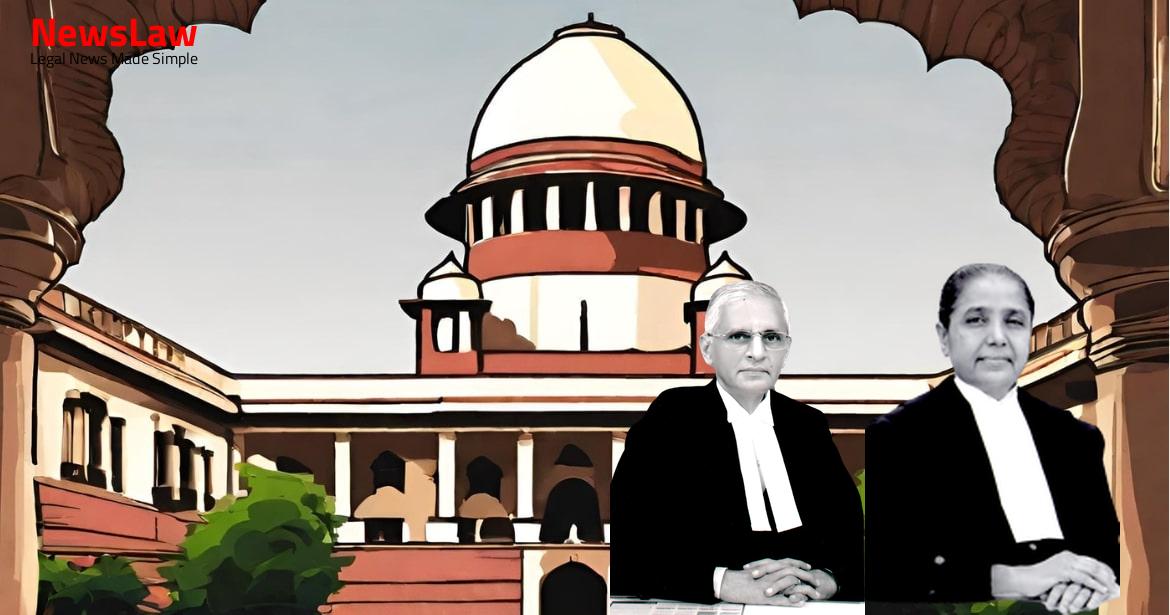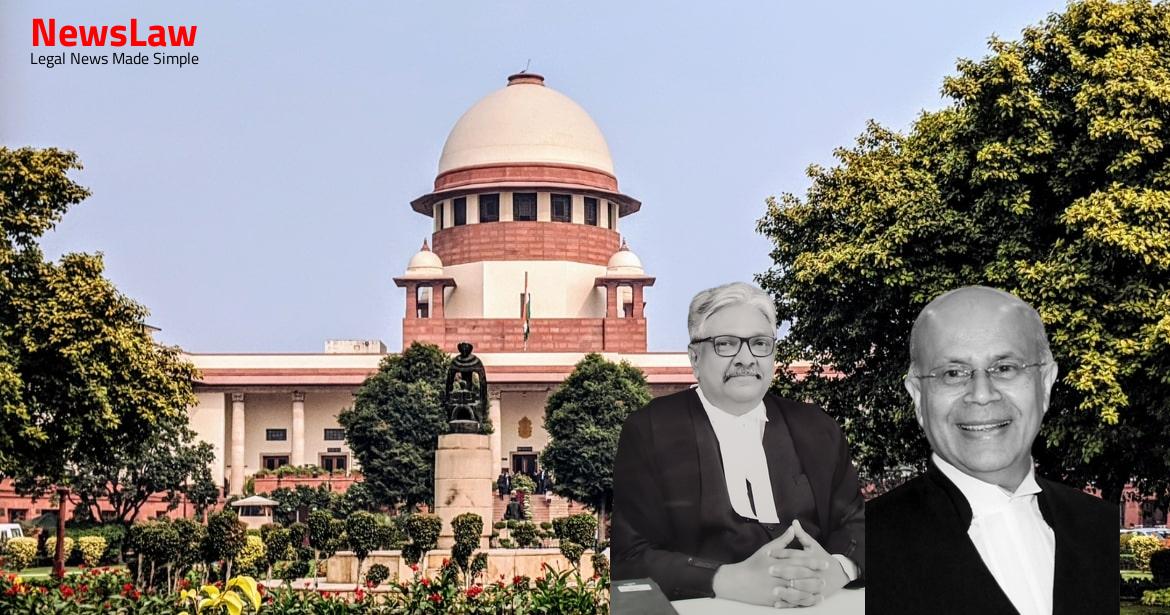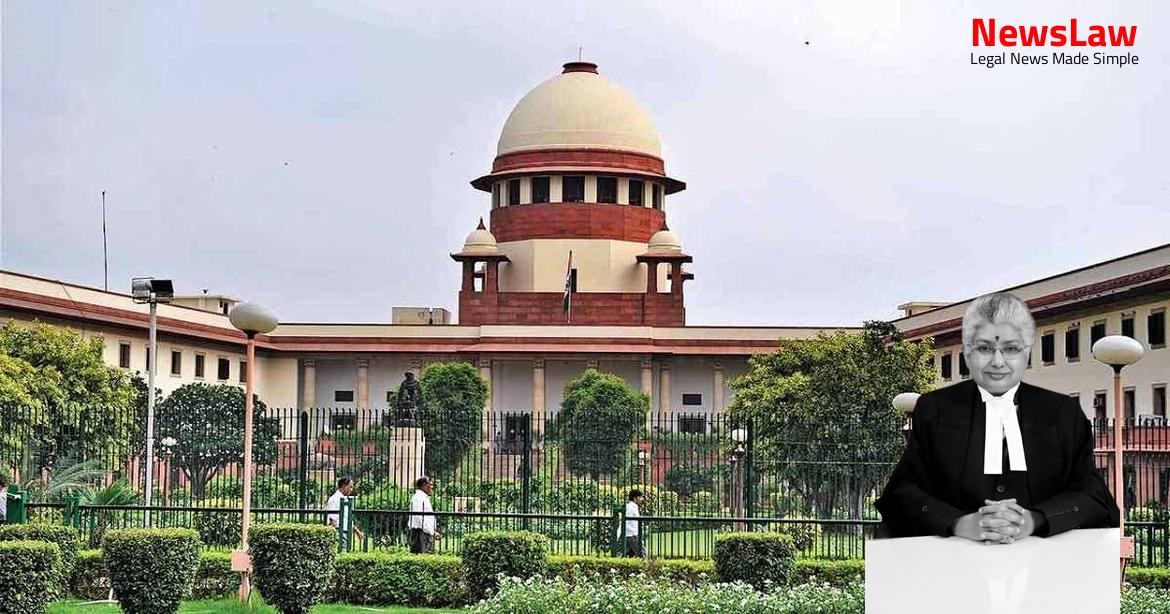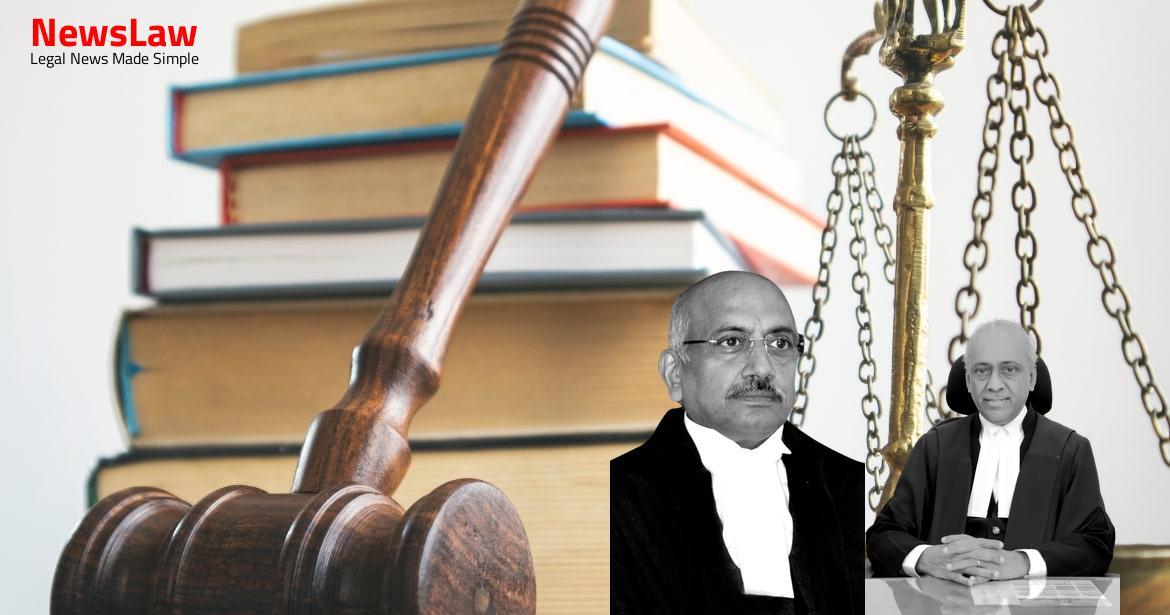In a significant legal ruling by the Supreme Court of India, the case of setting aside an arbitral award involving a financial institution and individuals was decided. The Court emphasized the expeditious nature of proceedings under Section 34 of the Arbitration Act, highlighting the need to focus solely on specified grounds. This judgment sets a precedent for future arbitration cases, ensuring a swift and efficient resolution process.
Facts
- The appellant, a financial institution, advanced a loan of Rs.50,00,000 to the respondent.
- The loan was secured by a mortgage with deposit of title deeds and a demand promissory note was executed for repayment.
- Dispute arose as the respondent failed to repay the loan and discharge liabilities.
- Arbitration clause in the agreement led to the dispute being referred to an Arbitrator.
- District Judge dismissed the application under Section 34 of the Act to set aside the award.
- Both parties adduced oral and documentary evidence before the Arbitrator.
- Respondent Nos.1 and 2 filed writ petitions before the High Court after their application under Section 151 CPC was dismissed.
- Arbitrator’s award directed the respondents to pay Rs.63,82,802 with interest and costs.
- Respondent Nos.1 and 2 later filed an application under Section 151 CPC to adduce evidence.
- High Court set aside the District Judge’s order and directed to recast the issues.
- District Judge was instructed to allow Mr. X and Mr. Y to file affidavits of their witnesses.
- Both parties were to be given the opportunity to present their evidence by affidavit.
- The District Judge determined that new evidence was unnecessary in the Section 34 application.
Also Read: High Court Acquittal Case of State of Uttar Pradesh v. Jai Prakash
Arguments
- Proceedings under Section 34 of the Act are summary in nature with a limited scope.
- Validity of the award must be decided based on materials before the arbitrator.
- No scope for introducing fresh evidence before the court in Section 34 proceedings.
- High Court erred in interfering with the trial court’s order on an interlocutory application.
- Petitioner did not provide exceptional grounds for leading fresh evidence in Section 34 proceedings.
- District Judge rightfully rejected the application to lead evidence.
- High Court misinterpreted the decision in Fiza Developers case.
- Ms. E.R. Sumathy, representing the respondents, argued that additional evidence is necessary to prove the grounds stated in the application under Section 34 of the Act.
- The respondents sought to adduce evidence to prove the grounds listed in Section 34(2)(a) of the Act.
- The High Court rightly allowed the writ petitions, granting the opportunity to the respondents to present evidence in the proceedings under Section 34 of the Act.
- The proceedings under Section 34 of the Act are summary in nature, focusing on the specific grounds mentioned in Section 34(2) or other relevant sections to set aside the award.
- It is crucial for the expeditious disposal of cases that arbitration cases under Section 34 of the Act are decided based only on the pleadings and evidence before the arbitral tribunal and the grounds specified under Section 34(2) of the Act.
- The counsel for the respondents pointed out Rule 4(b) of the Karnataka High Court Arbitration Rules, which applies all proceedings of the Civil Procedure Code to such arbitration proceedings under Section 34 of the Act, allowing for the filing of affidavits by the respondents and their witnesses.
Also Read: Judgment Review: Supreme Court’s Ruling on the Capital Punishment Appeal
Analysis
- Section 34 of the Arbitration Act does not require framing of issues as under Order 14 of the Code.
- Applications under Section 34 are considered summary proceedings with a focus on the grounds stated in Section 34(2).
- Cross-examination of affidavit swearers should be limited to necessity only.
- Permission to adduce evidence should be based on necessity and relevance.
- The time frame for disposal of Section 34 applications is specified as one year.
- Additional evidence should be related to the pending issues and must be justified.
- The application process under Section 34 is distinct from a regular suit and aims for expeditious resolution.
- Procedural rules, like Karnataka High Court Arbitration Rules, are applicable but subject to court discretion.
- The court may modify the procedure based on case-specific factors or local rules.
- The objective of sub-sections (5) and (6) of Section 34 is to ensure timely disposal of applications.
- The necessity for additional evidence and cross-examination must be convincingly demonstrated.
- The focus should be on considering grounds through existing evidence and the arbitral award.
- In a summary proceeding under Section 34 of the Arbitration Act, the respondent is given an opportunity to file objections or a written statement, followed by filing of affidavits in proof from both parties if necessary.
- Framing of issues in Section 34 proceedings is deemed unnecessary.
- The judgment in Fiza Developers emphasized that Section 34 proceedings should not be conducted like regular civil suits.
- The requirement to furnish proof in Section 34 proceedings has led to inconsistent practices in some High Courts, which insisted on conducting the proceedings akin to civil suits despite the Supreme Court ruling.
- The amendment to Section 34(2)( a ) is recommended to ensure expeditious conduct of Section 34 proceedings.
- The purpose of the 1996 Arbitration Act is speedy resolution, making framing of issues and taking oral evidence in Section 34 proceedings contradictory to the Act’s objective.
- The Justice B.N. Srikrishna Committee highlighted the need for amending Section 34(2)( a ) of the Arbitration and Conciliation Act, 1996.
- The amendment to Section 34 by the Arbitration and Conciliation (Amendment) Act, 2019 substituted ‘furnishes proof’ with ‘establishes on the basis of the record of the Arbitral Tribunal.’
- The Act emphasizes minimal court interference in arbitration matters and a sense of urgency in promptly disposing of arbitration cases brought before the court.
- Proceedings under Section 34 are considered single issue proceedings, requiring the party seeking to set aside the arbitral award to furnish proof to the court.
- Section 34 of the Act outlines the process for setting aside an arbitral award.
- An application for setting aside an arbitral award must be filed by a party after issuing a prior notice to the other party.
- The application should be accompanied by an affidavit confirming compliance with the notice requirement.
- The application must be disposed of expeditiously, within a period of one year from the date the notice was served upon the other party.
- High Court failed to consider that the respondents did not prove exceptional grounds for adducing evidence.
- District Judge’s order was not erroneous, therefore High Court should not have interfered.
- Supervisory jurisdiction under Articles 226 and 227 should not have been used in this case.
Also Read: Synergy and Solution Incorporation v. Vipin Dhopte – Landmark Judgement by Supreme Court of India
Decision
- The order of the District Judge dismissing the application filed under Section 151 CPC in AS No.1 of 2008 is affirmed.
- The impugned judgment dated 12.09.2014 passed by the High Court of Karnataka at Bangalore in Writ Petition Nos.18374-75 of 2010 (GM-RES) is set aside.
- The appeals are allowed.
- The learned District Judge is directed to take up AS No.1 of 2008 and dispose of the same expeditiously in accordance with the law.
Case Title: M/S. CANARA NIDHI LIMITED Vs. M. SHASHIKALA
Case Number: C.A. No.-007544-007545 / 2019



